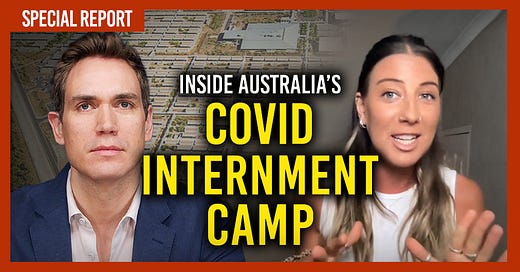A helpful interview from Australia
And, a couple longer reads I've found interesting recently tagged on at the bottom
What hits me here is that this really does show “public health” as the means to circumvent the legal protections we have created, really over a millennia, to protect people from the abuses of unfettered state power. A new crime has been created, and that crime is called “you might be sick”. There is no right to trial or anything, no guarantee of counsel, no reading of your rights, but if an official determines you are guilty of that crime, you will be punished. In Australia that punishment may now include the police coming to your home and dragging you away to your local prison camp.
From Unherd reporter Freddie Sayers… full interview at the first link, abbreviated clip posted second. But I appreciated his “come on liberals, where are you?”.



If you watch the longer interview, some other interesting notes include the comment that Hayley, because she was stressed in the camp and wanted to take a walk or run to calm down, was offered Valium instead (hello dystopian medical technocracy that just wants you safely sitting at home, properly drugged to deal with any problem). She talks more about how alone she felt - again, no counsel was offered, no one to help her. She wasn’t even told she’d be there for 14 days until she got there. And also that she was told that if she misbehaved, they’d keep her there for longer. Sure sounds like a prison to me.
And then an excerpt from that longer interview from inside the camp, especially being shared for the “it doesn’t have to make sense” line, I think. It’s like some people enjoy being anonymous drones in the system. It’s easy and comfortable and safe for them. Hayley wants to live, her captors are happy just being alive.
Full credit to the people who, back in March 2020, were already saying “the state response is going to be worse than the disease”. Good things could come of this though… I can’t find it right now, but I read someone a few days ago predicting a generational turn to center-right from all of this, because never has there been a greater case for limiting the power of the bureaucracy over the lives of people. It could happen. And there are good institutions being created today precisely because things have gotten so bad. Some fresh light may be shining on the other end of this.
Last week I passed along The Vaccine Moment, Part One, which included the line,
I have learnt more about human nature in the last two years than in my preceding forty-seven.
Indeed.
A couple other pieces I’ve enjoyed recently
PIECE ONE: The First Refusal, by Walter Kim
The technologies changed, but the sales pitch remained the same. Empowerment. Help in working my will. I could memorialize my life in photos, make new “friends” and keep in touch with old ones, pore through the history of all human knowledge, and pay my bills online. In return, I would lose large portions of my days to addictive loops of vain amusement, create a compendious record of my activities that could be exploited by unseen forces, and open myself to surveillance by government powers. As ever, I took the deal. I took it out of inertia and convenience and because I told myself that if the time came, I could always reject it or adjust.
The time has come.
PIECE TWO: Darkening Senses: John Donne, Byung-Chul Han, and the Palliative Society, by Matthew Omelesky
“The society of survival,” Byung-Chul Han concludes in The Palliative Society, “has no sense of the good life.” It has only the bare life, but the “more life becomes survival, the greater the fear of death…” …here we have one of the leading philosophers of our era, Byung-Chul Han, asserting with good reason that humanity is actually following a dangerous path of convergent evolution with our microscopic nemesis, “this undead being which only proliferates, that is, survives without actually living.” I wish this were not so. Indeed, to borrow the earthy language of the playwright John Webster, I think I would sooner eat a dead pigeon taken from the soles of the feet of one sick of the plague than willingly partake in the inhuman farce of this palliative society.




This kind of Australian government behavior should destroy tourism into the country until these policies are clearly, permanently renounced. Even if you support these camps, and house arrest quarantines, there is no point in planning travel into an island country that will force you indoors for your entire stay.
Everyone keeps saying the guy talking to her when she's on the balcony is South African. I'm not convinced at all, the accent is somewhat similar but the way he puts words together does not sound like someone well versed in English (and yes I know he could be Afrikaans but he still would know English better than this guy seems to). Am I wrong or is there some legs to that. I remember when they were rifle bashing a guy in Melbourne the guy in full hat riot gear had some sort of maybe Eastern European (or maybe Israeli) accent.